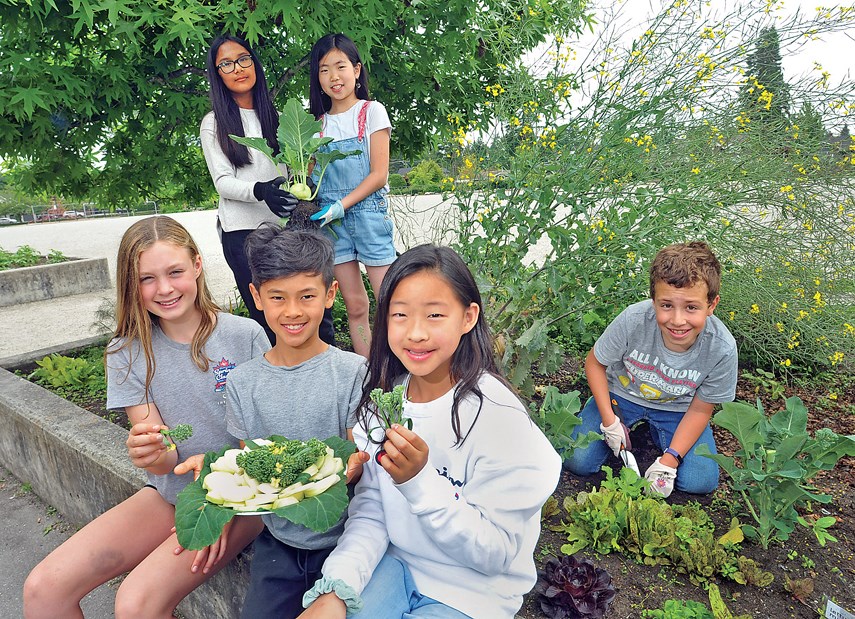A special friendship between a senior and students blossomed after the harvest at Highlands Elementary.
The original plan called for flowers to brighten up four empty garden beds by the gravel field, when the school reopened in 2009 after a rebuild.
“Then we discovered the kids were way more interested in vegetables,” exclaims former Highlands teacher Edie Rustemeyer, who routinely comes out of retirement to help students find their green thumbs.
The school’s vegetable garden is thriving with potatoes, garlic, berries and greens in late May. Grade 4 and 5 students are eager to get outside for their monthly, hands-on sustainability lesson from Edible Garden Project.
Today, the students play plant detectives – using magnifying glasses to comb through kale in search of pests and pollinators.
Shrieks of delight echo across the school grounds, from the direction of the garden.
“It’s a snail!” “There’s another one!”
Off to the side, another group of students is sorting and cleaning lettuce seeds harvested from a crop they planted last year.
Below the surface of their leafy exploration are myriad curriculum connections – that not only benefit the students but also result in positive global impacts they are making.
“The sustainability comes into the science aspect of things, and looking at climate change and how we can grow our own food in our own backyard,” explains Highlands Grade 4/5 teacher Jennifer Sherlock. “The children take some of their skills home and we’ve found that some families start growing their own vegetables in their own backyards, as a result of this.”
Grade 4 student Jordan has taken those lessons to heart, spreading the sustainability message to his family.
“I like growing things. I like watering things,” says Jordan, who planted potatoes in his backyard.
“I had my sister jump on the shovel because [the soil] was so hard.”
Harvest time brings nourishment to Highlands – and it can yield hilarious results.
The students move inside for lessons in nutrition and healthy eating, as the green bounty is shared throughout the school.
Bright green kale muffins make for a curious-looking snack, at first leery glance.
“I thought it was going to be really gross, but the orange zest made all the kale taste go away,” says Muriel, a Grade 5 student.
Potatoes, meanwhile, are the cream of the crop at Highlands.
“It’s just really fun to find potatoes. It’s a spark of joy,” says fellow fifth-grader Kelly.
Surplus potatoes were turned into works of art last winter, as students made mashed potato snowmen.
“And then they just ate their art,” says Sherlock with a smile.
“It was just a riot,” adds Rustemeyer. “They had so much fun.”
Highlands’ garden has also been good for the soul.
A regular visitor to the school is a senior who lives at Amica retirement residence in Edgemont Village.
“She sits here and she spends time enjoying the gardens,” says Sherlock.
One year, the senior collected seeds from one of the flowering plants at Highlands and planted them in the garden at Amica – cultivating a beautiful connection between the school and retirement home.
“Then she gave us back all of the seeds from the flowers that she had planted at Amica – so I thought that was really sweet,” says Sherlock.
The green project at Highlands is sustained through support from the school’s PAC and grants from community partners including Vancouver Coastal Health.
“To be effective gardeners, they need to use real tools,” explains Rustemeyer.
Parents also play a vital role in keeping the garden growing – especially when school is out for the summer.
“We assign a family a week in the garden – so they come and they water and they harvest anything that they can,” explains Sherlock.
Amy Ing is the education co-ordinator for Edible Garden Project. Along with Highlands, Ing has been gardening with some other students in the North Vancouver School District - at Cleveland, Carisbrooke and Queen Mary schools.
“I think it’s extremely crucial, especially in our education curriculum, to get students engaged and have that hands-on experimental learning,” says Ing. “This garden education program here definitely implements the seed-to-plate concept.”
Edible Garden Project paid another visit to Highlands in June, to celebrate the start of summer and fresh food. The teachers and students collectively made a colourful salad to share.
“And the kids always ask for seconds,” says Rustemeyer. “Anything that we grow, the kids eat.”



